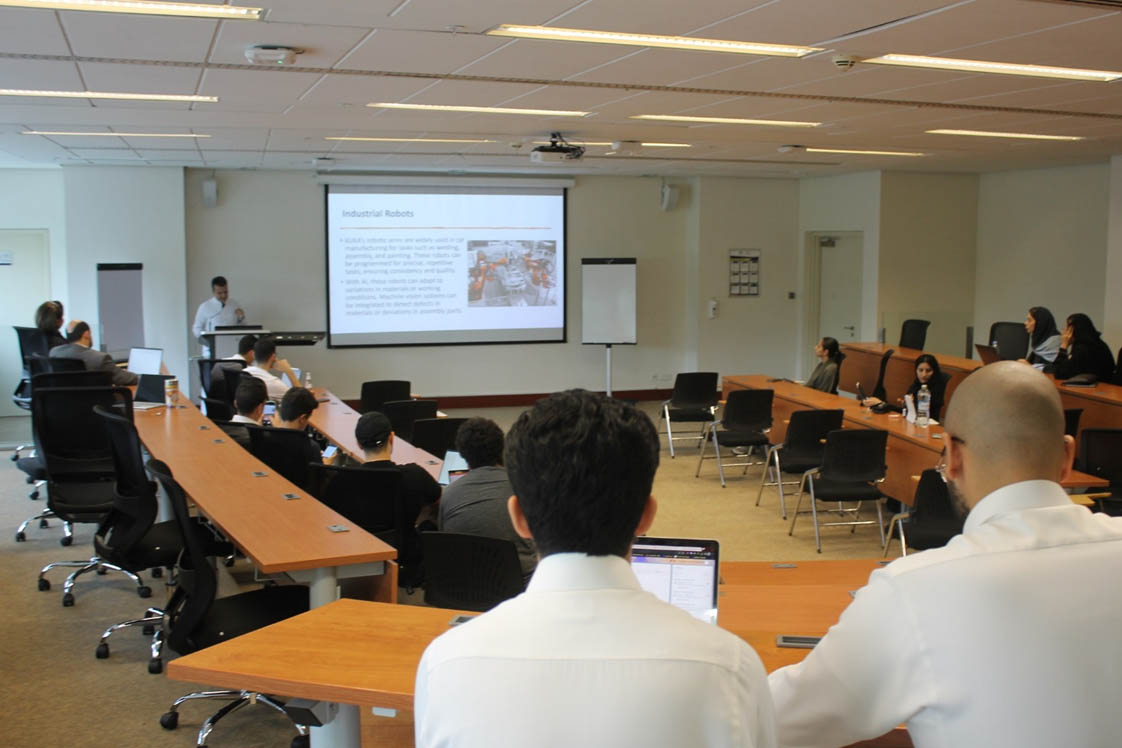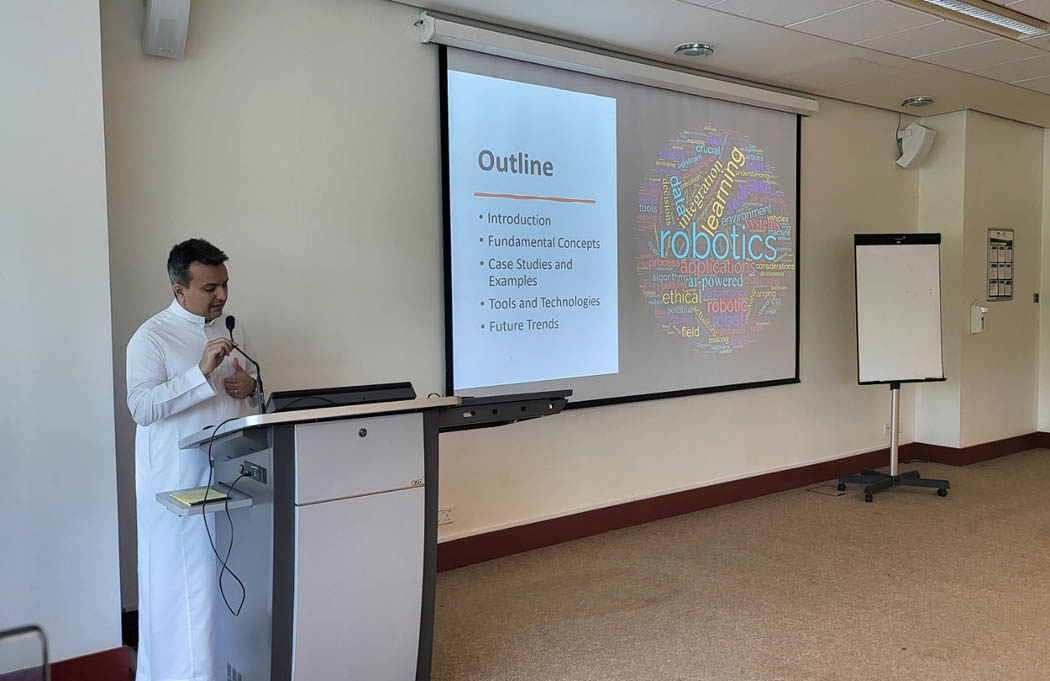A seminar titled “Artificial Intelligence in Robotics” was hosted at the AI Research Center on October 30th, 2023. The seminar explored the synergy of AI and Robotics with Eng. Ahmed Hamidalddin, Director of Robotics Lab at Alfaisal University’s College of Engineering.

In a captivating seminar on the ever-evolving landscape of artificial intelligence (AI) in robotics, the speaker shed light on the fusion of these two domains and how they are reshaping our future. The seminar commenced with an introduction to the fundamental concepts of AI and robotics. Following that, Eng. Ahmed explained how AI is often perceived as the brain of robotic systems while robotics act as the body, and the integration of AI into robotics is akin to giving the body a powerful and intelligent mind. This integration has been driven by the continuous advancements in technology, allowing us to create robots capable of automating repetitive precise tasks, thereby increasing efficiency and safety in various industries.
Eng. Ahmed discussed that over the years, the applications of robotics have extended to various sectors, including healthcare, where robotic systems assist in surgeries and provide precise medical procedures. In our everyday lives, devices like robotic vacuum cleaners and smart assistants have become commonplace, showcasing the seamless integration of AI and robotics. Beyond this, the seminar explored diverse areas such as industrial robots, medical robots, autonomous vehicles, agricultural drones for precision farming, and social robots equipped with natural language processing (NLP) for more human-like interactions, opening up possibilities for companionship with the elderly and offering medical advice. A critical aspect of the discussion was the importance of understanding the AI components that power these robots. Machine learning (ML), neural networks (NN), sensors (serving as the eyes and ears of robots), and actuators (acting as the muscles) were dissected, highlighting their role in creating intelligent robots. Feedback loops and learning paradigms like supervised learning, unsupervised learning, and reinforcement learning were also explored, demonstrating how robots can adapt and improve over time. One notable example presented was the Roomba robotic vacuum, which initially followed a random path but has since integrated AI to navigate and overcome obstacles efficiently. This reflects the progression in robotics due to AI integration.
The seminar was attended by students enrolled in the AI and machine learning courses in the College of Engineering as well as students of the Game Development Club (GDC). Eng. Ahmed further discussed current trends in AI and robotics, including learning from demonstration, swarm robotics, soft robotics, and the growing potential of human-robot collaboration. The seminar also delved into the tools and technologies behind AI in robotics, emphasizing the significance of programming languages like Python and C++, as well as frameworks such as the Robot Operating System (ROS) for programming robots. On the machine learning side, frameworks like TensorFlow and PyTorch provide powerful tools for developing and training AI models. The combination of CPUs, GPUs, sensors, and actuators was highlighted as the driving force behind the remarkable capabilities of modern robots. Mr. Ahmed underscored the pivotal role of NVIDIA Jetson in robotics, which enables high-performance computing on the edge, supports deep learning and generative AI, and aids in the development and prototyping of robotics and autonomous machines. Its scalability, flexibility, and strong community support have made it a cornerstone in the AI robotics landscape. In the final segment of the seminar, the discussion on Human-robot interaction (HRI) and ethical considerations was made, where issues such as data privacy and security when collecting sensitive data for AI with robots were covered.
To address the queries of the enthusiastic audience, Eng. Ahmed recommended using the ROS Nvidia Isaac-Sim platform for students interested in embarking on capstone endeavors, underlining the importance of staying up-to-date with the latest tools and technologies in AI and robotics.
In conclusion, AI in robotics is a field of immense potential and transformation. It has the power to revolutionize industries, enhance our daily lives, and open up new possibilities that were once confined to the realm of science fiction. Eng. Ahmed Hamidalddin’s seminar left the audience inspired and eager to explore this dynamic field further.
Eng. Ahmed Hamidalddin is a Lecturer in Electrical Engineering as well as the director of Robotics Lab at the College of Engineering in Alfaisal University. He joined Alfaisal in 2019, and has since been teaching electronics and other courses as well as laboratories, in addition to multiple other academic and administrative roles. Prior to joining Alfaisal University, he was a researcher at KACST (King Abdulaziz City for Science and Technology), where he worked on photonic and microelectronic materials and devices. He holds MSc and BSc degrees in Electrical Engineering from the University of Southern California and KFUPM, respectively.
Alfaisal University’s AI Seminar Series explores ways artificial intelligence (AI) can benefit society, our environment, and the economy. In weekly talks, leaders from academia, industry, and NGOs, who are at the forefront of using AI for social good, showcase AI applications that are forging positive changes in healthcare, the environment, education, technology, government and more. Like the AI Center itself, the seminar series has a broad scope, covering both new methodological contributions, ground-breaking applications, and impact on society. More information about the AI Center’s activities and scientific programs can be viewed via ai.alfaisal.edu.















